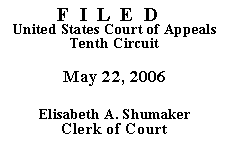

| UNITED STATES OF AMERICA, |
|
Before KELLY, O'BRIEN, and TYMKOVICH,
Circuit Judges.
After examining the briefs and appellate record, this panel has determined
unanimously that oral argument would not materially assist the determination of
this appeal. See Fed. R. App. P. 34(a)(2); 10th Cir. R. 34.1(G). The case is
therefore ordered submitted without oral argument.
Pedro Rosales-Trujillo pled guilty to illegal re-entry after deportation subsequent to an aggravated felony conviction (second degree robbery) in violation of 8 U.S.C. § 1326(a)(1), (a)(2) and (b)(2).(1) He was sentenced to seventy-seven months imprisonment.(2) Counsel has filed an Anders(3) brief and moves to withdraw. In this brief, counsel states he could find no arguably meritorious claim to raise on Rosales-Trujillo's behalf. Rosales-Trujillo has filed his own pro se brief raising two issues: (1) his sentence is greater than necessary to achieve the purposes of sentencing under 18 U.S.C. § 3553(a) and (2) his sentence is excessive and unreasonable under United States v. Booker, 543 U.S. 220 (2005).
We review sentences imposed post-Booker for reasonableness. United States v. Kristl, 437 F.3d 1050, 1053 (10th Cir. 2006). "[A] sentence that is properly calculated under the Guidelines is entitled to a rebuttable presumption of reasonableness." Id. at 1054. "The defendant may rebut this presumption by demonstrating that the sentence is unreasonable in light of the other sentencing factors laid out in [18 U.S.C.] § 3553(a)." Id.
Rosales-Trujillo's sentence was properly calculated under the guidelines. The guideline applicable for a conviction under 8 U.S.C. § 1326 is USSG §2L1.2.(4) USSG §2L1.2, comment. Under this guideline, the base offense level is 8. USSG §2L1.2(a). However, this guideline calls for a 16 level enhancement to the base offense level if the defendant was previously deported or remained in the United States after a felony conviction for a "crime of violence." USSG §2L1.2(b)(1)(A)(ii). The commentary to USSG §2L1.2 defines "crime of violence" as including robbery. USSG §2L1.2, comment. (n.1(B)(iii)). Rosales-Trujillo was convicted of Second Degree Robbery in 1995. He was subsequently deported in 1997, twice in 1998, and again in 2001 and 2004.(5) Therefore, the 16 level enhancement was warranted, resulting in an adjusted offense level of 24. Following a 3 level downward adjustment for acceptance of responsibility under USSG §3E1.1, Rosales-Trujillo's total offense level was 21. Pursuant to USSG §4A1.1 and USSG Ch.5, Pt.A, his criminal history category was VI, resulting in a guideline range of 77-96 months imprisonment. Thus, Rosales-Trujillo's seventy-seven month sentence is presumptively reasonable.
Rosales-Trujillo fails to rebut the presumption of reasonableness. His rebuttal is limited to a conclusory allegation that his sentence is greater than necessary to achieve the purposes of sentencing under 18 U.S.C. § 3553(a). The district court considered the factors set forth in § 3553(a) and found a seventy-seven month sentence reflected the seriousness of the offense, afforded adequate deterrence, and protected the public. Specifically, the court noted that although it was a significant sentence, Rosales-Trujillo's criminal history and repeated re-entries into the United States were also significant.
After a careful review of the record, we conclude the case is wholly frivolous. We GRANT counsel's request to withdraw and DISMISS the appeal.
Entered by the Court:
Terrence L. O'Brien
United States Circuit Judge
*. This order and judgment is not binding precedent except under the doctrines of law of the case, res judicata and collateral estoppel. The court generally disfavors the citation of orders and judgments; nevertheless, an order and judgment may be cited under the terms and conditions of 10th Cir. R. 36.3.
1. Initially, Rosales-Trujillo pled guilty to illegal reentry after deportation subsequent to a felony conviction in violation of 8 U.S.C. § 1326(a)(1), (a)(2) and (b)(1). Pursuant to the original plea agreement, Rosales-Trujillo and the government agreed to a final adjusted offense level of 9. This agreement was conditioned on Rosales-Trujillo having no felony conviction qualifying as a conviction under USSG §2L1.2(b)(1)(A), (B), (C). Later, the government learned Rosales-Trujillo's criminal history contained convictions which could be classified as convictions under these provisions and moved to revoke the plea agreement. Rosales-Trujillo subsequently moved to withdraw his guilty plea, which was granted. A new information was filed charging him with the current offense.
2. At the time he committed the current offense, Rosales-Trujillo was under a term of supervised release for a prior illegal re-entry conviction. Because the commission of the current offense constituted a violation of his supervised release, a petition to revoke supervised release was filed. At the sentencing hearing concerning the current offense, Rosales-Trujillo admitted to violating his supervised release and was sentenced to twelve months imprisonment, said sentence to run concurrent to his seventy-seven month sentence. He does not challenge his twelve-month sentence on appeal.
3. Anders v. California, 386 U.S. 738 (1967).
4. Rosales-Trujillo was sentenced pursuant to the 2004 edition of the United States Sentencing Guidelines Manual to avoid any ex post facto issues. All citations to the guidelines in this decision refer to the 2004 guidelines unless otherwise indicated.
5. The commentary explains: "A defendant shall be considered to be deported after a conviction if the deportation was subsequent to the conviction, regardless of whether the deportation was in response to the conviction." USSG §2L1.2, comment. (n.1(A)(ii)).